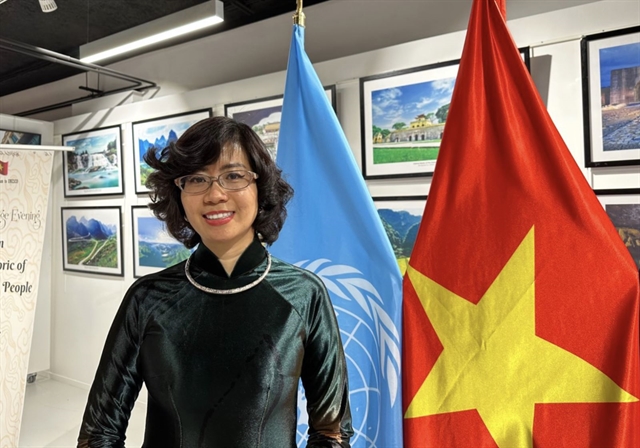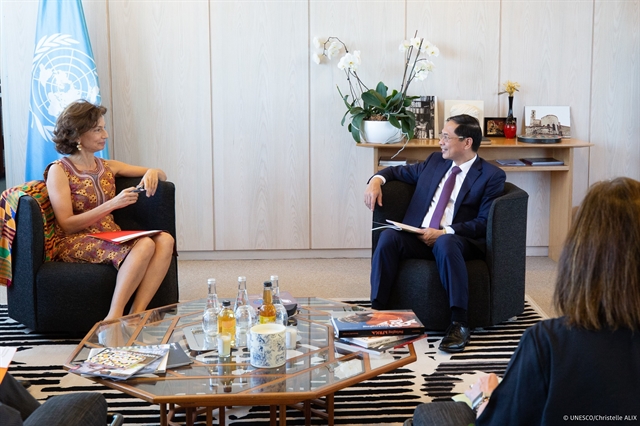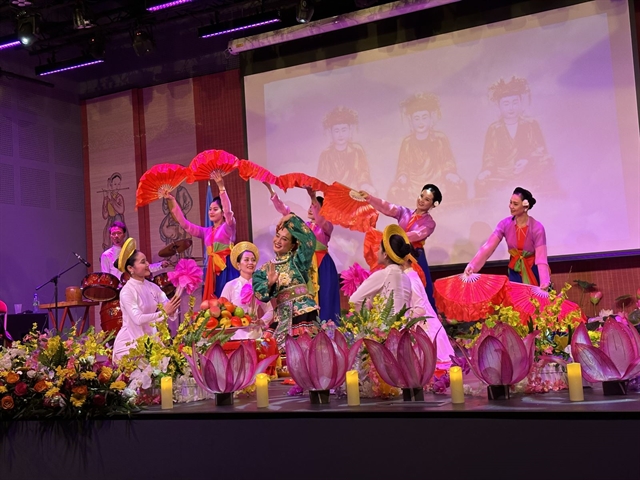.jfif) Opinion
Opinion

 |
| Former Permanent Representative of Vietnam to UNESCO Ambassador Lê Thị Hồng Vân. VNA/VNS Photo |
Ending a successful term as Permanent Representative of Việt Nam to the United Nations Educational, Scientific and Cultural Organisation (UNESCO), former Ambassador Lê Thị Hồng Vân spoke with the Vietnam News Agency about a successful year for Việt Nam’s multilateral external relations and cultural diplomacy at UNESCO’s headquarters in Paris, France, and proposed directions for the coming years.
How do you evaluate the accomplishments of Việt Nam's multilateral external relations and cultural diplomacy at UNESCO in 2023?
The year 2023 was very successful for Việt Nam's multilateral external relations and cultural diplomacy at global organisations such as UNESCO.
Firstly, the year saw the highest number of mutual visits between Việt Nam and UNESCO, contributing to deepening bilateral relations, optimising the knowledge and resources from the organisation for the country’s development.
The first official visits by the Minister of Foreign Affairs Bùi Thanh Sơn in June 2023 and the Minister of Culture, Sports and Tourism Nguyễn Văn Hùng in November 2023 to UNESCO affirmed Việt Nam's active and responsible role. In return, the official visit of the Director of UNESCO World Heritage Centre Lazare Eloundou Assomo to Việt Nam in March 2023 and the Assistant Director-General of UNESCO for Africa Priorities and Foreign Relations Firmin Edouard Matoko in July 2023 marked the strong commitment of UNESCO leadership to promote cooperation and support Việt Nam in heritage conservation, addressing climate change, resource management and sustainable development.
Secondly, 2023 witnessed historical milestones in Việt Nam’s multilateral external relations at UNESCO, demonstrating the international community’s confidence and support for Việt Nam’s ability of making contributions to and management capacity at global multilateral institutions. For the first time, Việt Nam has undertaken positions in five key management mechanisms of UNESCO at the same time, including three Vice Chair positions.
Thirdly, Việt Nam won many titles, and a large number of Việt Nam’s heritages were honoured at UNESCO during the year. With the recognition of Hạ Long Bay-Cát Bà Archipelago world natural heritage site, the addition of Đà Lạt and Hội An cities to the UNESCO Creative Cities Network, and the honouring of the progenitor of Vietnamese traditional medicine, Hải Thượng Lãn Ông Lê Hữu Trác, Việt Nam has so far won 65 UNESCO titles. Last year, Việt Nam also successfully repatriated the seal “Hoàng đế Chi bảo” (Treasure of the Emperor), the imperial seal of the Nguyễn Dynasty.
Fourthly, in 2023, Việt Nam continued to make important contributions to shaping strategic issues and global policies with the hosting of the first UNESCO international conference on harnessing the values of UNESCO titles for sustainable development in July, 2023 in Ninh Bình Province.
Fifthly, last year also saw the organisation of many important events of Việt Nam at UNESCO headquarters, contributing to promoting and spreading cultural values as well as the image of the nation and people of Việt Nam among international friends. The three nights of Vietnamese Heritage at UNESCO highlighted the rich tradition, diverse culture and the depth of Vietnamese culture, sending out the image of a country dynamic in reform and integration with rich tradition and strong national identity.
 |
| UNESCO Director-General Audrey Azoulay received Minister of Foreign Affairs Bùi Thanh Sơn during his first official visit to the UNESCO headquarters in Paris, France on June 5, 2023. VNA/VNS Photo |
What is your perspective on comments suggesting that economic development may pose challenges to the protection of titles and cultural heritage? Drawing on the experiences of different countries, can you provide insights into strategies for harnessing the added value of UNESCO titles and heritage to stimulate economic development and vice versa?
The documents of the 13th Party Congress clearly outlined the significant relationship between economic growth and cultural development. The overall direction of the Party and State is not to sacrifice progress, social justice, cultural values or environmental protection for the sake of economic growth.
In recent years, the conservation and promotion of the values of UNESCO titles and heritage in Việt Nam have achieved many successes. Both the Director-General of UNESCO and the Director of the UNESCO World Heritage Centre have affirmed that Việt Nam is an exemplary model of a harmonious balance between the conservation and promotion of heritage values, and sustainable tourism development.
The experience of Việt Nam and other countries showed that in order to harmonise preservation and development, it is necessary to enhance public awareness of conserving and promoting values of titles, while improving State management efficiency over the heritage through completing the legal document system and designing plans for preserving and promoting the titles, along with paying greater attention to the role of communities and people.
At the same time, it is necessary to speed up digital transformation in heritage management and exploitation, diversifying heritage communications and education methods, strengthening regional, national and international connectivity in protecting and empowering cultural heritage with effective exploitation of economic aspects of the heritage in order to increase their contributions to socio-economic development.
 |
| A performance of the Mother Goddesses of Three Realms, the intangible cultural heritage of humanity, at the Vietnam Cultural Centre in France in November 2023. VNA/VNS Photo |
What does Việt Nam need to do to continue promoting multilateral external relations and cultural diplomacy at UNESCO in the upcoming period?
The next 2-3 years are crucial for advancing the comprehensive, synchronised process of innovation and international integration. Within this context, cultural diplomacy plays a significant role in showcasing cultural values, the strength of the Vietnamese people, enhancing the nation's soft power, and realising the aspirations for national development.
In my opinion, at UNESCO, Việt Nam should focus on five major tasks:
Firstly, Việt Nam needs to uphold the pioneering role in proposing ideas and initiatives and optimising UNESCO's policies in grasping global cooperation trends, improving legal frameworks, and enhancing institutional and human capacities to realise the national targets. Additionally, the country should actively introduce policies and share our exemplary experiences, such as valuing cultural promotion, developing policies, and promptly completing the national target programme for Việt Nam's cultural development in the next ten years.
Secondly, it is vital to make the Việt Nam-UNESCO partnership deeper, more substantial and effective. The Vietnam National Commission for UNESCO, specialised sub-committees, the secretariat of the commission, and the Vietnamese delegation to UNESCO and relevant agencies should continue playing a core role in promoting the effective implementation of the memorandum of understanding on cooperation between Việt Nam and UNESCO for the 2021-2025 period, aligning with UNESCO's medium-term strategy and Vietnam's socio-economic development strategy. The exchange of high-level delegations will further elevate the partnership between the two sides.
Thirdly, Việt Nam needs to engage in building and submitting dossiers of Vietnamese heritage for UNESCO titles to create more resources and encourage sustainable socio-economic development models in localities. Dossiers of Vietnamese heritage for UNESCO titles for the Yên Tử - Vĩnh Nghiêm - Côn Sơn cultural complex, Óc Eo - Ba Thê archaeological site, and the dossiers for the intangible cultural heritage performances for the Festival of Bà Chúa Xứ Goddess at Sam Mountain and Đông Hồ Folk Painting Craft should be advanced, while the conservation and promotion of the values of UNESCO-recognised world heritage sites, including the project to conserve the Thăng Long Imperial Citadel in Hà Nội, should be supported.
In particular, Việt Nam must show strong performance in implementing the country’s positions in five key management mechanisms of UNESCO, including three Vice-Chair positions, to enhance its contribution to common concerns and meet the international community's confidence and support.
Finally, popularising the image of the nation, people and culture of Việt Nam to the world should be the priority. With 65 UNESCO titles spanning all 63 cities and provinces, Việt Nam contributes to enriching, protecting and promoting the cultural treasures of humanity. This helps international friends better understand the country, its people, traditions and history.
Việt Nam will host the eighth Asia Pacific Geoparks Network (APGN) Symposium in September 2024 in the northern province of Cao Bằng, and together with UNESCO, commemorate the 300th anniversary of the birth of the progenitor of Vietnamese traditional medicine Hải Thượng Lãn Ông Lê Hữu Trác. This will be a chance to honour the intelligence, qualities, character and lofty ideals of the Vietnamese people among international friends. – VNS